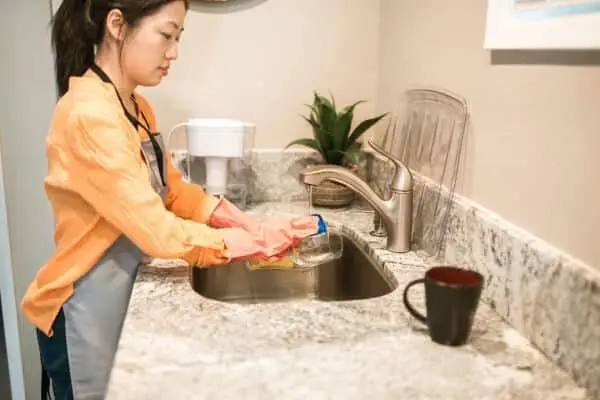The Essential Guide to Starting a Mobile Coffee Van Business
The enduring popularity of tea and coffee combined with the rise of mobile catering makes starting a mobile coffee van a brilliant way to tap into this growing market.
So, if this sounds like your dream business, read on for your essential guide to setting up a mobile coffee van business.
You’ll discover the advantages and disadvantages of running a mobile coffee van, how to find your perfect products and customers, and how to make essential training more convenient with Caredemy’s online training courses for food businesses.
The Pros and Cons of a Mobile Tea and Coffee Business
A mobile coffee cart offers endless possibilities, whether you set up a stand at public events, visit local offices and workplaces or attend street food markets.
But it’s vital to consider the advantages and disadvantages of a coffee van business before you make your move. Here are some factors to consider:
Positives of owning a mobile coffee van
- Low initial costs – less financial commitment means you’ll turn a profit sooner than with a traditional cafe or coffee shop.
- Year-round demand – tea and coffee are in demand all year round with no need to worry about a seasonal slump in sales.
- High profit potential – the margins on tea and coffee are generally high, and artisanal products will help boost your revenue.
- Flexibility – you can choose where and when you work to fit your business around your other commitments.
Negatives of starting a mobile coffee business
- Competitive market – your mobile coffee shop will be competing with traditional coffee shops and big brands like Starbucks and Costa Coffee.
- Limited selling hours – your mobile coffee bar will probably make most sales during standard business hours.
- Time-consuming – apart from your selling hours, you’ll need to spend time sourcing stock, perfecting your drinks and admin tasks.
- High stress – like most small business owners, you’ll have to fulfil many different roles including sales, stock ordering, and bookkeeping.
Finding Your Ideal Customer
People of all ages love hot drinks, and if you also sell other products like soft drinks and snacks, you’ll appeal to even more people. So your mobile coffee van business could attract an almost limitless range of customers.
However, specialising in a particular niche will help you perfect your branding, price point and product offering.
Here are some target markets to consider:
- Busy shopping areas and malls
- Town centres and business districts
- Festivals, fairs and food markets
- Sporting events and other organised outdoor events
- Corporate events like conferences and trade shows
Visibility is key, so be sure to create a unique brand identity, engage on social media and attend local events. You could also consider a loyalty programme to keep your customers coming back.
Insurance, Permits and Regulations
Always check with your local authority to see what permits they require for mobile food and drink businesses. Typical requirements include:
- Food business registration
- Environmental Health Office registration
- Mobile food business licence
- Food business safety inspection
You’ll need to register with HMRC if you plan to operate on a self-employed basis, and if you choose to run a limited company, you’ll need to register with Companies House.
You’ll also need various types of insurance cover when running a mobile tea and coffee business. This could include Product Liability Insurance, Public Liability Insurance, Business Vehicle Insurance and Contents Insurance, among others. Always seek professional advice to ensure your business has adequate coverage.
Crafting the Perfect Menu
You might need help narrowing down your drinks menu, and focusing on a limited and high-quality menu will help you stand out against the competition.
Coffees: The standards like Americanos, Lattes and Cappuccinos will be popular, but also consider cold brew coffee and seasonal specialities.
Teas: As well as the classics like English Breakfast Tea or Earl Grey, you could also offer green teas and herbal teas.
Soft Drinks: Options like hot chocolate, soft drinks or bottled water will appeal to those seeking an alternative to tea and coffee.
Extras: Pastries, biscuits and even sandwiches will complement your drink offering.
Getting the Right Vehicle
Your vehicle isn’t just a mode of transport – it’s your storefront!
Whether you opt for a van, trailer or truck, ensure it has enough room for your equipment and stock. It also needs to be easy to maintain and visually appealing to attract potential customers.
Essential Training for Mobile Tea and Coffee Business Owners
Staff training is essential to your mobile coffee van’s smooth operation and your customers’ safety and satisfaction.
Apart from barista training to help you craft the perfect brew, some essential training courses for a mobile coffee and tea business include:
- Food Hygiene and Safety
- Allergen Awareness
- Improving your Food Hygiene Rating
- First Aid in the Workplace
You’ll also need HACCP (Hazard Analysis and Critical Control Point) training, which is mandatory for UK food and drink businesses.
Caredemy’s online training courses for food businesses are an easy way to fit essential training around everything else you need to organise. You can study at any time and location, cutting out the need for expensive travel and accommodation costs.
Our high-quality course materials can be used online, or you can download them to study offline whenever suits you best. Your Caredemy personal learning dashboard will help you keep track of your progress, and if you need support, you can contact our expert Student Support team for help with your queries.
Starting a mobile coffee business can be a rewarding journey. It requires dedication, passion and hard work, but with the right preparation and training, your mobile coffee van will be brewing success in no time!


